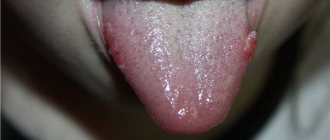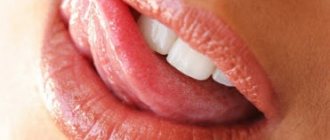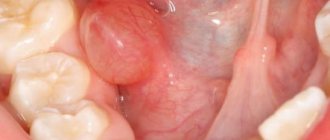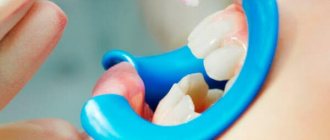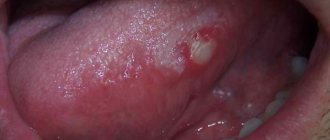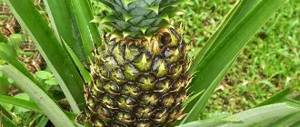A change in the color of the child's tongue surface makes parents in earnest worry.
There is no need to panic right away - black coating on the tongue in children is not always pathological .
Why might it appear?
Keep in mind! Most often, a child’s taste organ darkens for the following reasons:
- Eating large amounts of food containing natural or synthetic dyes . Candies, tea, lemonade, dark berries (currants, blackberries, blueberries, mulberries), as well as jams and compotes based on them, can color your tongue dark.
- Taking certain medications. This organ is often colored dark by iron preparations in the form of drops, which are prescribed to the baby to treat anemia. Also, the color of the taste organ often changes during prolonged treatment with antibiotics, or when taking activated carbon.
In rare cases, the tongue darkens for reasons unknown to modern medicine.
Thus, the surface of the taste organ may darken due to excessive growth of the papillae of the tongue, followed by their keratinization and darkening .
Stay up to date! This phenomenon is called “villous tongue”; in the absence of complaints, special treatment is not required, and the condition of the taste organ is normalized within a few weeks.
Less commonly, the cause of darkening of a child’s tongue is various pathological conditions of organs and body systems:
- gastritis;
- colitis;
- enteritis;
- pathologies of the gallbladder and pancreas;
- acute deficiency of B vitamins and vitamin PP;
- dysbacteriosis;
- stomatitis;
- caries;
- oral candidiasis;
- Crohn's disease;
- lead poisoning;
- immunodeficiency, HIV;
- severe dehydration;
- infectious diseases of the upper and lower respiratory tract: sore throat, ARVI, bronchitis.
Note! The cause of dark plaque in a baby can also be acidosis - a shift in the acid-base balance of the body towards increasing acidity.
The most common causes of a black tongue
- Taking iron supplements (sorbifer, ferronal, etc.) in the form of syrups. These medications can be prescribed to children with iron deficiency anemia. After completing the course of treatment, it will again acquire normal color;
- Intestinal diseases. These include colitis, enteritis, dysbacteriosis. With these pathologies, not the whole thing is stained, but only its root.
- Diseases of the stomach, liver, gall bladder and bile ducts;
- Candidal stomatitis. With this pathology, the dark color is accompanied by a dense coating of off-white color;
- Diseases for which the child is forced to take antibiotics for a long time. In this case, the child’s tongue does not turn black immediately, but several days after the start of antibacterial treatment.
The symptom is constant, and this should alert parents;
First, let's figure out what a black coating on the tongue means and why it appears. If a black coating appears on a child's tongue, you cannot ignore it. It may indicate problems with the functioning of the stomach.
- Usually the appearance of plaque indicates that the baby’s stomach is not yet ready to digest the food that was provided to him.
- Also in children, this symptom may indicate the presence of candidiasis and dysbacteriosis.
In the case when a person is absolutely healthy, his tongue should be soft pink. In the presence of various diseases, you can notice a whitish-yellow coating on the tongue. Few people pay attention to this kind of formation, but when a plaque forms, for example, black in color, then panic begins. People are concerned about the unusual color of the tongue (black, dark brown).
There is no need to panic in the presence of such a dark coating. Try to remember if you have consumed any of the foods that can color your tongue (blueberries, activated charcoal, chocolate, sweets with dyes). If you do not remember whether you have consumed any of these products, consult your doctor.
Black coating on the tongue often indicates the development of serious diseases of the digestive tract. The shade and density of plaque indicates the patient’s condition. If the plaque is too dark and dense, then the patient’s condition is very complex. Such plaque can form on the teeth and the inner surface of the cheeks.
Black plaque is a sign of the development of such disorders within the body:
- deterioration of the pancreas;
- acidosis;
- gallbladder diseases;
- Crohn's disease;
- angina;
- depressed adrenal function;
- microflora imbalance.
Black plaque should be classified as a symptom of a disease in the body rather than as an independent disease.
The main reason for the appearance of plaque on the tongue is the bacteria accumulated on it. Most often, the bulk of plaque accumulates at the root of the tongue. This happens due to the fact that this place is the least mobile, while the tip of the tongue has the opportunity to clean itself while eating, drinking or during a conversation.
If parents find a little white coating on their baby’s tongue after waking up, then there is no need to panic for this reason. Since this process is considered normal, the main thing is that the natural structure of the tongue is visible under the layer of plaque. However, if the structure of the plaque or its thickness has changed, you must visit a doctor.
Plaque on a baby's tongue may differ in color, and this depends primarily on the reasons that provoke its appearance. The most common is the formation of white plaque. However, as mentioned above, its appearance does not at all mean the manifestation of any disease. Another type of plaque that should not cause concern to parents is a uniform, whitish coating. It usually appears immediately after feeding with formula or milk.
But there are cases when the presence of a white coating on the tongue of an infant indicates health problems. Namely:
- Cases when plaque spreads to the cheeks and gums throughout the day and does not disappear.
- Quite often, a white coating forms against the background of respiratory diseases.
- When plaque completely covers the baby’s entire tongue and is accompanied by symptoms such as nausea, stomach pain and diarrhea.
Also, the color of the coating on the tongue may be yellow, and this manifestation clearly indicates that there is a problem in the body. For example, a yellow tongue indicates that the child has liver problems. When plaque is located on the lower part of the tongue, this may indicate a disease such as jaundice.
In the case when a child has problems with the lungs, his tongue may be covered with a coating with a greenish, brown or gray tint. Of course, we are accustomed to seeing such manifestations mainly in the adult part of the population, but such symptoms also occur in children.
If a baby suffers from an infectious disease, a number of infections can cause a red coating to appear on the tongue. Also, similar manifestations are observed when a small organism is attacked by toxic substances. When problems with the kidneys occur, the tongue may acquire a rich burgundy hue.
We suggest you read: Are front baby teeth treated in children?
A black coating on the tongue is also found in infants. As you yourself understand, it does not bode well, since this symptom occurs mainly in seriously ill people. In children, the formation of black plaque may indicate diseases such as damage to the digestive system, cholera, Crohn's disease, and also indicate severe dehydration. But it is worth noting that attentive parents are unlikely to suddenly develop symptoms of this kind. However, as they say, he who is aware is...
A little higher, we have already paid some attention to this issue. Let's now figure out what specific disease a white coating on the tongue may indicate. A white cheesy coating in a baby is the main sign of a disease such as candidiasis, or in common parlance – thrush. The diagnosis can be clarified if this symptom is accompanied by the following signs:
- the child behaves excessively capriciously and restlessly;
- the baby refuses to take the breast because it hurts to suck;
- The baby's gums, palate and inner surface of the cheeks are clearly inflamed.
Candidiasis is an inflammatory process caused by the yeast-like fungi Candida. It is worth clarifying that this type of mushroom is found in small quantities in any human body. However, a decrease in immunity leads to an imbalance of microflora, which provokes uncontrolled proliferation of fungi.
Parents of an infant suffering from thrush should be wary. Since this disease without appropriate treatment can become chronic, which in turn can provoke an allergic reaction.
As a treatment for thrush in infants, it is recommended to use a soda solution. To do this, wrap gauze around the index finger, which must be placed in the solution and thus gently wipe the mucous membrane of the baby’s mouth.
Often in infants, the coating on the tongue has a yellow tint. If this manifestation occurs during a hot period of time, then without the presence of other symptoms, this is considered normal. However, if the color begins to change (becomes brighter), and the thickness of the layer also changes (increases), this may be a sign of a disease of the digestive system.
For example, if the gallbladder does not work properly, a yellow coating usually appears on the tongue. However, such a symptom may also indicate severe intoxication of the body, which occurs against the background of prolonged and frequent constipation. In addition, a yellow coating can also indicate lesions in the liver.
If you notice that your child's tongue has turned yellow, take it to the doctor as soon as possible. It would also be a good idea to visit a gastroenterologist for the purpose of a comprehensive examination and establishing the exact cause of the disease. A nursing mother needs to monitor her own diet more closely.
Try to completely avoid eating foods and drinks that contain preservatives and dyes, and you should also limit your intake of fatty foods. But it is advisable to consume fruits and vegetables in large quantities, this also applies to all fermented milk products. The main thing is to ensure that the baby does not develop allergic reactions to any product.
In cases where the cause of a yellow tongue is an imbalance in the stomach and intestines, it is advisable for a nursing mother to adhere to a certain diet that her doctor recommends.
Parents should know that in the morning, even before the first feeding, they should examine the baby’s tongue. A healthy baby's tongue should normally be free of any inflammation or plaque and have a pale pink color. Please note that depending on the time of year, your baby may periodically develop a coating on the tongue.
But when a newborn develops a green coating on the tongue, you should not put off going to the doctor, since this sign does not bode well.
The presence of a green tongue in an infant primarily indicates problems with the large intestine. If duodenal pathology is observed, plaque is usually localized in the middle part of the tongue. If, together with a green coating, redness of the tip of the tongue is observed, then we can definitely say that there is a violation of the acidity of the stomach.
Also, a green tongue may indicate kidney problems. Of course, such a pathology in infants is quite rare, but it does occur. In the case when the problem is fungal in nature, plaque forms mainly in the central part of the tongue. By the way, you should know that green plaque often appears in children during treatment with antibiotics and drugs that can reduce the body’s protective functions.
In conclusion, it is worth noting that parents need to be more attentive to the health of their own children and, for preventive purposes, carry out routine dental examinations as often as possible. Therefore, even if you cannot avoid the disease, you will definitely detect it at an early stage.
Associated symptoms
If a black coating is detected on the child’s organ of taste, you should pay special attention to the child’s accompanying symptoms and complaints.
Possible symptoms:
- nausea and vomiting;
- diarrhea with particles of undigested food;
- loss or abnormal increase in appetite;
- stomach ache;
- dry or bitter mouth;
- weakness;
- temperature increase;
- headache;
- redness of the mucous membranes of the mouth and tonsils;
- pain when swallowing.
It is worth noting! Sometimes, even in the presence of dark gray and black deposits on the tongue, the child voices absolutely no complaints.
The complete absence of accompanying symptoms is characteristic of fungal infection of the mucous membranes of the mouth, as well as when plaque occurs for non-pathological reasons.
Dark tongue in the morning
A dark tongue in the morning is most often a consequence of poor oral hygiene. It affects those who forget to brush their teeth before bed. Firstly, food debris accumulates in the oral cavity during the day, which themselves are an excellent breeding ground for the active reproduction of pathogenic bacteria. Secondly, microorganisms multiply in the mouth overnight, as if in an incubator, which provoke the formation of plaque. If you thoroughly clean your teeth, gums and tongue of plaque in the evening, it simply won’t have time to form by the morning.
But if you carefully monitor the condition of your mouth, and a dark coating still forms in the morning, you should consult a doctor, since in this case, most likely, a dark coating on the tongue signals a problem in the functioning of your body. You shouldn't be intimidated by a visit to the doctor - most likely. The matter will be managed with a well-chosen diet. A balanced diet will benefit your body, strengthen your immune system, and improve your complexion. And, of course, it will help get rid of plaque on the tongue.
In what case should you consult a doctor and undergo an examination?
If the deposits disappear on their own after rinsing your mouth or drinking, there is no need to go to the hospital, since the cause of the darkening of the tongue is most likely food.
If the plaque does not disappear when rinsing, but appears again after cleaning the tongue, you should make an appointment with a pediatrician.
If the blackening of the surface is accompanied by acute abdominal pain, diarrhea or vomiting, you should immediately consult a doctor or call an ambulance.
You should not try to treat your child yourself or try folk remedies without consulting a specialist and finding out the reasons for the blackening of the tongue.
You should know! Self-medication can cause serious harm to the baby's health.
Black coating on the tongue
The tongue, an indispensable component in communication and an important component for the digestive system, also acts as a signaling organ.
A change in its color can warn of some disruptions in a person’s physical health. Its normal shade is pink with a small layer of translucent coating. A different color or change in the consistency of the tongue is a deviation from the norm. If white or yellow plaque does not cause any particular concern, since it occurs frequently, then the appearance of a black tint in it is a rare occurrence. This indicates significant pathologies in the body.
True, a dark layer may appear on the tongue after eating blueberries, mulberries or other food products that contain coloring substances.
How is diagnosis carried out?
The doctor begins the diagnosis with a visual examination of the patient , assesses the appearance of the tongue and the nature of the deposits, and interviews the child and mother for complaints and associated symptoms.
Next, the doctor prescribes tests and diagnostic procedures:
- clinical blood test;
- Analysis of urine;
- blood chemistry;
- culture of microflora from the oral and nasal cavity;
- stool occult blood test;
- Ultrasound of the digestive organs.
If necessary, to clarify the diagnosis, the doctor can give a referral for gastroscopy and colonoscopy .
For your information! A specialist can prescribe all diagnostic procedures in a complex, or several of them separately.
If necessary, the pediatrician gives a referral to see specialists: dentist, otolaryngologist, gastroenterologist, infectious disease specialist.
Treatment
Based on the results of the examination, the doctor makes a diagnosis and prescribes treatment.
In each individual case, the treatment complex is selected individually based on the reasons for the formation of black deposits on the tongue, the patient’s age and the presence of concomitant diseases.
Treatment of black plaque:
- If the cause of the formation of black deposits is dental problems , treatment should be performed by a dentist.
- In cases where plaque has formed due to prolonged antibacterial therapy, the doctor cancels it or prescribes another drug.
- For candidiasis, antifungal drugs are prescribed (Fluconazole, Pimafucin)
- If you have stomatitis and fungal infection, rinse your mouth with antiseptic solutions (Chlorophyllipt, Hepilor).
- For gastritis, antacids (Maalox) and drugs to enhance the protective properties of the gastric mucosa are prescribed .
- In case of vitamin deficiency, are prescribed .
- If the cause of the black plaque is poisoning, it is recommended to take sorbents (Enterosgel, Polysorb, activated carbon).
If necessary, the doctor prescribes additional medications:
- probiotics (Acipol, Linex, Bifidumbacterin) and prebiotics (Duphalac, Lactusan) to populate the intestines with beneficial microorganisms and stimulate the production of your own healthy microflora;
- interferons to strengthen the immune system (Cycloferon, Kagocel).
Important! The specialist also gives mother and child recommendations on nutrition and oral hygiene, which must be strictly observed during the period of active treatment and after it.
What to do with all this
The most important thing that doctors (including Dr. Komarovsky) advise in such a situation is not to panic and try to treat the child with traditional methods or advice from the Internet. In any case, you should visit your pediatrician for an examination and possible further examination. This is especially true if the child complains of weakness and high temperature.
- The effect of food coloring. It is necessary to temporarily remove all coloring foods from the baby’s diet and everything will go away on its own and without a trace. To speed up this process, you can thoroughly clean the surface of the tongue with a soft toothbrush and continue to monitor the quality of your child’s oral hygiene.
- Plaque of fungal origin. You should not try to remove it. Treatment in such cases will consist of taking antifungal drugs in combination with treating the oral cavity with antiseptic solutions.
- Pathology of the digestive system. Elimination of the root cause leads to the rapid disappearance of any manifestations of black tongue. In the treatment of dysbiosis, eubiotic preparations (Linnex, Lacidofil, Bifidumbacterin and others) are good helpers, as well as following a gentle but rational diet.
- Hypovitaminosis. They are well corrected with complex vitamin preparations, with treatment with which all symptoms go away very quickly.
- Black hairy tongue. In this case, there is no specific therapy. This phenomenon most often goes away on its own. It is necessary to apply only preventive measures and treat the child’s oral cavity with antiseptic solutions.
Despite the fact that most often the causes of a black tongue in a child do not threaten his health, a visit to the pediatrician’s office should not be ignored. Only a specialist will help determine why such a problem appeared and how quickly it can be solved.
Hello, I would like to get a consultation from Dr. O.E. Komarovsky, I of course understand that the doctor is very busy, but hope, as they say, dies last, so I’ll take a risk.
My son, who turned one year old on December 22, 2013, noticed a month ago that his tongue had become black, although not all of it, but closer to the throat. Since we just had a routine annual medical examination, when we went to the ENT specialist I asked what it could be, the doctor replied that we needed to see a pediatrician and get a stool test.
On the same day, we went to an appointment with the local pediatrician, after listening to us, he looked at the tongue and said that he did not see any plaque on the tongue, I explained that the blackness on the tongue is mainly at the throat, and we must take into account that the child is small, he Doesn't let you see the tongue well. The doctor asked how the child was feeling, I replied that it was good, to which the doctor replied that he did not see any problems for concern, most likely the child had eaten something.
We invite you to familiarize yourself with 10 types of tongue glossitis with photos that will make everyone wary
I asked if I could clean off the plaque with a soda solution, the doctor said try it, and we left. At home, I cleaned off as much of the plaque as I could. However, since the plaque did not completely disappear, after three weeks, I again turned to the pediatrician with a request to prescribe a stool test for scatology. The analysis did not reveal any deviations.
Then I began to observe that our newly emerged upper teeth turned gray in places with black dots, the lower ones did not, I went to the dentist and explained that we periodically have a black coating on our tongue, to a greater or lesser extent, so perhaps the teeth turned gray from plaque. I would like to add that the color of the teeth began to change as soon as a black coating appeared on the tongue; before that, the teeth were white.
The dentist examined the child and said that perhaps he had a “hairy tongue,” and they began to brush his teeth with a brush and children’s toothpaste, but the teeth were still gray and remained that way. I would like to add that the child did not have any illnesses during this period and did not take any medications. My question to the doctor is that, has he encountered similar cases in his practice (our pediatrician, as I understand it, he has not) what a black coating on the tongue can mean, should we be worried, and what should we do?
Thank you in advance for your attention Doctor!
A child's black tongue does not look the best. Even a little creepy.
A child may turn black for completely peaceful reasons: he ate too much blueberries or blackberries, drank currant compote, etc. Moreover, food staining of the tongue black is caused not only by dark-colored food and drink.
Did you know that regular tomato juice, as well as taking certain medications, for example, activated carbon, can lead to dark coloration?
But all these cases are absolutely safe, the blackness disappears after a couple of days without a trace.
But if a child’s black tongue persists for a long time, there may be health problems that need to be treated.
conclusions
- there are both pathological and non-pathological causes of darkening of the tongue in a young child;
- plaque formation may be accompanied by alarming symptoms, such as vomiting and fever, or may occur without the appearance of additional symptoms and complaints;
- if the plaque does not disappear on its own, but appears again after cleaning the tongue, you should make an appointment for the child to see a doctor;
- Treatment can be prescribed only after a comprehensive examination and clarification of the causes of darkening of the tongue;
- the appearance of the taste organ will return to normal when the causes of the formation of black plaque are eliminated.
Classification
Not only the shade of plaque on the tongue can indicate one or another reason for its occurrence. Doctors will be provided with quite a lot of information about the location of the gray plaque on the tongue:
- tip of the tongue – lung disease or pathology of the cardiovascular system;
- root of the tongue – intestinal or kidney diseases;
- on the lateral surfaces - impaired functioning of the liver or gall bladder;
- the center of the tongue is a lesion of the spleen.
In addition, doctors pay attention to the fact that the more intense the plaque, the more severe the course of a particular disease.
Read also: Causes of excessive salivation at night
Such coating on the tongue is also distinguished depending on its prevalence:
- the tongue is completely covered with a gray coating;
- forms spots on the tongue;
- appears in small dots.

